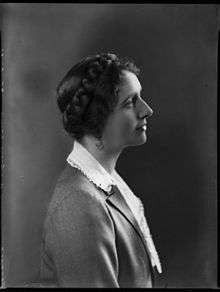Juliet Rhys-Williams
| Juliet, Lady Rhys-Williams DBE, DStJ | |
|---|---|
 | |
| Born | 1898 |
| Died | 1964 |
| Occupation | Politician, writer |
| Spouse(s) | Sir Rhys Rhys-Williams |
Juliet Evangeline, Lady Rhys-Williams, DBE, DStJ née Glyn (1898–1964), was a British writer and a Liberal Party politician who later joined the Conservative Party.
She began her career as private secretary to the Director of Training and Staff Duties at the Admiralty in 1918, becoming private secretary to the Parliamentary Secretary, Ministry of Transport, 1919–1920.
Political career
She contested the Pontypridd by-election, 1938 as a Liberal National candidate. Her candidacy attracted popular attention because she decided to stand when her baby daughter was just 8 days old.[1] As a supporter of the National Government she received the formal support of the local Conservative Association.[2] In a two-way contest she polled 40% of the vote. From then on her political activities were in support of the official Liberal Party. In 1943 she became Honorary Secretary of the Women's Liberal Federation. In 1944 she became Chairman of the Publications and Publicity Committee of the Liberal Party, serving for two years. Her ideas on income tax reform were published by the Liberal Party. She contested the 1945 General Election as the Liberal Party candidate for Ilford North.[3] She resigned after a disagreement on policy matters with her party's leaders.[4] Lady Juliet Rhys Williams was a member of the Beveridge Commission and unsuccessfully proposed a Basic Income in the form of a negative income tax, as an alternative to the main, insurance based recommendation of the Beveridge Report.
She left the Liberals and joined the Conservative Party, becoming an influential member of the Monday Club. During this time she corresponded with many politicians including Harold Macmillan about political and economic issues.
Following World War II, Lady Rhys-Williams became Honorary Secretary of the Economic Section, Congress of Europe and the Hague in 1948, Honorary Secretary of the United Europe Movement, 1947–1958, and chairman from 1958. She believed in uniting and strengthening Europe through trade and joined the European League for Economic Cooperation in 1948. However, she was against signing the Treaty of Rome and campaigned vigorously against joining the Common Market, which she thought would hand over British sovereignty to Europe and betray the Commonwealth. She also corresponded with a variety of people about the economic and political issues relating to Europe and European Union.
Lady Rhys-Williams was a governor of the BBC from 1952 to 1956. During this time she joined discussions on the breaking of the BBC's monopoly and the setting up of a new commercial channel. She also experimented on systems for colour television and broadcast on Woman's Hour. She was also interested in film. Together with her husband Sir Rhys Rhys-Williams she formed a company that filmed the books of her mother Elinor Glyn. She was also involved in the development of colour film.
Juliet Rhys-Williams was also concerned with health issues. She was Honorary Treasurer of Queen Charlotte's Hospital Anaesthetic Fund, 1928–1939, Honorary Secretary of the Joint Council of Midwifery (1934–1939) and a member of the Inter-Departmental Committee on Abortion (1937–1938). She was also a member of the National Birthday Trust Fund.
As her husband's estates were in Wales, Juliet Rhys-Williams spent much time there, and became involved with Welsh issues. She was a member of Bishop Llandaff's committee, which sought ways to alleviate poverty in the Rhondda valley in the 1930s, and she was also chairman of the Cwmbran Development Corporation 1955–1960. She invented the term of Negative income tax. She also wrote articles and books on politics, economics, philosophy and religion and had novels and plays published.
References
- ↑ Hull Daily Mail, 7 January 1938
- ↑ Hull Daily Mail, 3 February 1938
- ↑ 'RHYS WILLIAMS, Juliet Evangeline, (Lady Rhys Williams)', Who Was Who, A & C Black, an imprint of Bloomsbury Publishing plc, 1920–2014; online edn, Oxford University Press, 2014 ; online edn, April 2014 accessed 28 Sept 2014
- ↑ William Nicoll, 'Williams, Dame Juliet Evangeline Rhys (1898–1964)', Oxford Dictionary of National Biography, Oxford University Press, 2004; online edn, Oct 2008 accessed 28 Sept 2014
External links
|